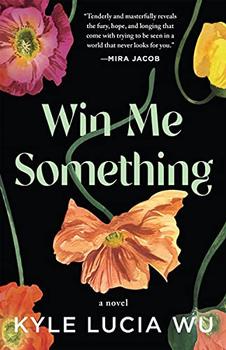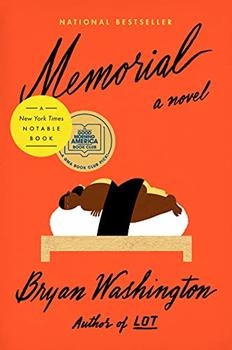Summary | Excerpt | Reviews | Beyond the book | Read-Alikes | Genres & Themes | Author Bio

Rowan Hisayo Buchanan's 2017 literary debut, Harmless Like You, swivels its focus between an estranged mother and son struggling with personal dilemmas in timelines decades apart. Her follow-up, Starling Days, also shifts its third-person point of view from character to character, but this time the narrative concerns a wife and husband who find themselves embarking on separate but interconnected journeys.
Mina Umeda is a classicist who suffers from depression, which may in part have been triggered by the death of the beloved grandmother who raised her. Her husband Oscar grew up with his mother in the U.K., but now lives in New York with Mina. He works for his father's import business, though he feels odd about being employed by the parent who wasn't around for most of his childhood. After Mina is picked up by the police while standing on a bridge contemplating suicide, Oscar persuades her to take some time off from her academic work to try to improve her mental health through a change of scenery. A rental property held by Oscar's father that needs renovation provides an opportunity for the couple to temporarily escape to London, where Oscar reconnects with a childhood friend, Theo, and makes plans to visit his mother in Scotland.
Once in London, Mina finds herself falling for Theo's sister, Phoebe, a lifestyle blogger whose marriage has recently collapsed. As Mina becomes more and more distracted by Phoebe in what seems like the lead-up to an affair, Oscar becomes increasingly distressed by his inability to understand or cope with Mina's shifting moods. The mental separation between wife and husband becomes physical when Oscar returns to the States for a business trip that stretches on longer than planned. This trip gives Mina the chance to pursue Phoebe, and Oscar the chance to tentatively bond with his father and his father's wife, Ami.
As the characters explore new feelings and dip into uncomfortable emotional spaces, Buchanan questions conventional beliefs around issues of mental illness, sexuality and relationships, opting to portray their thoughts sensitively and without the weight of standard foregone conclusions. At one point, for example, Mina reflects on the absurdity of widespread views about self-love:
They said that to be loved you had to love yourself. Bullshit. How were you supposed to love yourself if no one else could see anything of value beneath your skin? No, she thought, it was the other way around. To love yourself you had to be loved. She was lucky to have Oscar. She was lucky to have a man who looked at her like she was a precious creature.
While the last sentence in this passage may understandably make some readers cringe, and while Mina's overall assertion defies popular wisdom, it's difficult to deny the basic truth in her declaration: Loving oneself may be important to maintaining fulfilling relationships with others, but the idea that doing so is simply a matter of personal responsibility is easily challenged.
The question of how much people should rely on one another becomes a central theme in Buchanan's book. Mina's feelings of dependence on both Oscar and Phoebe may be "unhealthy," but that she sometimes feels unable to seek out peace and comfort on her own is simply a reality for her—if only a temporary one. That Mina begins to explore her attraction to Phoebe without knowing how Oscar will feel about it may also not be ideal, but it makes sense that her depression (which at moments makes her suicidal) affects what she's willing to risk for even a small glimpse of happiness. Meanwhile, Oscar's own struggles to sort through his family history hinder his ability to communicate meaningfully with Mina.
The novel includes stark descriptions of suicidal ideation and suicide attempts, and it depicts these experiences with little preamble or dramatic buildup, showing Mina's desire to die existing alongside "normal" life rather than in opposition to it. This might be unsettling for some readers, but Buchanan's buoyantly efficient writing only gives as much attention to disturbing details as necessary, and often dilutes them with humor, such as when Phoebe asks Mina to tell her something about herself:
Mina considered her options. I want to run my tongue along the dent in your collarbone that your top has made visible. Nope. Sometimes I want to die and sometimes I want to buy a box of tomatoes and stand by the fridge eating them out of a paper carton and I don't understand how I can hold both desires. Nope.
While Starling Days is filled with sad moments, it's far from a tragedy. It isn't a "feel-good" read either, but one that allows human emotions and wants, in all their disarray, to mingle coherently on the page. The result is a morally complex story driven by elaborately drawn characters who are mesmerizing despite (or because of) their fragility.
![]() This review was originally published in The BookBrowse Review in May 2020, and has been updated for the
May 2021 edition.
Click here to go to this issue.
This review was originally published in The BookBrowse Review in May 2020, and has been updated for the
May 2021 edition.
Click here to go to this issue.

If you liked Starling Days, try these:

by Kyle Lucia Wu
Published 2021
A perceptive and powerful debut of identity and belonging - of a young woman determined to be seen.

by Bryan Washington
Published 2021
What happens when a love story collides with the limits of love--and everyone has an opinion?
Your guide toexceptional books
BookBrowse seeks out and recommends the best in contemporary fiction and nonfiction—books that not only engage and entertain but also deepen our understanding of ourselves and the world around us.